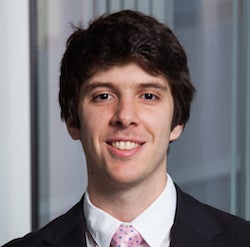The Ken Kennedy Institute's July Member of the Month, Dr. Santiago Segarra, is an Assistant Professor of Computer Science and Electrical and Computer Engineering.
Santiago received his B.Sc. degree in industrial engineering with highest honors (Valedictorian) from the Instituto Tecnológico de Buenos Aires (ITBA), Argentina, in 2011, the M.S. in electrical engineering from the University of Pennsylvania (Penn), Philadelphia, in 2014 and the Ph.D. degree in electrical and systems engineering from Penn in 2016. From September 2016 to June 2018 he was a postdoctoral research associate with the Institute for Data, Systems, and Society at the Massachusetts Institute of Technology. Since July 2018, Dr. Segarra is an Assistant Professor in the Department of Electrical and Computer Engineering at Rice University.
His research interests include network theory, data analysis, machine learning, and graph signal processing. Santiago will also be one of the instructors for the Ken Kennedy Institute's Machine Learning Boot Camp on August 6-7, 2020.
What is your favorite book?
“Foundation” by Isaac Asimov. I first read this book as a teenager and this sparked my love for sci-fi. I remember saving pesos from here and there as a kid to buy the next Asimov’s book in my to-read list. I forgot about the content of most of these books, but I still remember that sense of wonder and intrigue. Very pure feelings and, for me, “Foundation” encapsulates those feelings of a teenage dreamer.
How do you explain your research in one sentence?
I combine fundamental concepts from Network Science with modern tools from Machine Learning and Signal Processing to leverage the structure of networks for the better understanding of data defined on them.
What is your favorite aspect of your research?
I work on tools and concepts that have potentially very broad applicability, and this allowed me to collaborate and learn from multiple disciplines. I might have in the same day meetings discussing projects on genetics, psychology, and urban planning. This is the beauty of working on methodologies that are transversal to domains of knowledge.
The second aspect is that the research covers a wide range of the theory-to-practice spectrum. Some of the papers that we write are essentially math papers, with theorems, propositions, and several pages of mathematical proofs. By contrast, other papers are very practical and are concerned with the computational implementation of the tools developed. This diversity keeps the research interesting and appealing to different types of students.
What challenges do you see in your research that you didn't expect?
Interdisciplinarity can be a double-edged sword. Although the success stories are a lot of fun, there are many projects that die off mainly due to language barriers between disciplines, miscommunication, or lack of alignment of the expectations. Overcoming these barriers is certainly a challenge in any new collaboration.
What is a favorite experience with the Ken Kennedy Institute or describe a time the Ken Kennedy Institute supported you in the past?
Following the analogy of the energy barrier, the Ken Kennedy Institute truly acts as a catalyst bringing down the energy needed for these collaborations. Apart from condensing researchers that are naturally open to computational approaches in their disciplines, the monthly lunches serve the very useful purpose of getting to know what everyone is working on in a relaxed setting.

